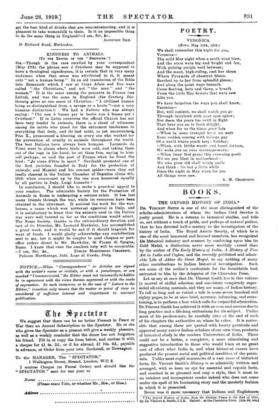KINDNESS TO ANIMALS.
(To THE EDITOR OF TER " SPECTATOE."3 Sre,—Though in the ease recalled by your correspondent (May 17th) the phrase non e Cristiano may be supposed to have a theological significance, it is certain that in very many instances when that sense was attributed to it, it meant only " not a human being." In an old translation of the Bible into Romansch which I saw at Coire Adam and Eve were called "the Christians," and not "the man" and "the woman." It is the same among •the peasants in France (see Littr4), and was the same in England (the Century Dic- tionary gives as one sense of Christian : "A civilized human being as distinguished from a savage or a brute "—not a very humane distinction!) We had a Fattore who was always saying : "Chi non è buono per le bestie non è buono per i Cristiani." If in Latin countries the official Church has not *en very tender to animals, there is a oloud of witnesses among its saints who plead for the extremest tenderness to everything that feels, and its last saint, as yet =canonized, Pius X., pronounced a blessing on every one who worked for the prevention of cruelty to animals throughout the world. The best Italians have always been humane. Leonardo da Vinci went to places where birds were sold, and taking them out of the cage in his hand, he set them free, saying to him- self perhaps, as said the poet of France when he freed the bird "Jo viens d'être in mort." Garibaldi promoted one of the first societies founded in Italy for the protection of animals, and Mazzini and his rescued spider—were they not loudly cheered in the Italian Chamber of Deputies (Jima 6th, 1913) when summoned up by the one man honoured equally by all parties in Italy, Luigi Luzzatti ?
In conclusion, I should like to make a practical appeal to your readers. The admirable Society for the Protection of Animals in Rome ie undergoing a serious crisis. It has lost many friends through the war, while its resources have been- strained to the uttermost. It assisted the work for the war- horses, a cause which won universal approval in Italy, and it is satisfactory to know that the animals used in the Italian war were well treated as far as the conditions would admit. The Rome Society, thanks to the extraordinary devotion and tact of its Director, Mr. Leonard Hawksley, has accomplished a great work, and it would be sad if it should languish for want of funds. I would gladly acknowledge any contribution sent to me, but it might be simpler to send cheques or post- office orders direct to Mr. Hawksley, 66 Piazza di Spagna, Borne. I know that even the smallest help will be acceptable.






































 Previous page
Previous page